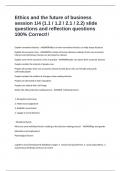Exam (elaborations)
Ethics and the future of business session 1/4 (1.1 / 1.2 / 2.1 / 2.2) slide questions and reflection questions 100% Correct!!
- Course
- Institution
Explain normative theories - ANSWERReflect on how normative theories can help shape decisions Explain the economic view - ANSWERThe motive of human decision-making int heir own economic interest and well-being. Humans are perceived as rational Explain some of the economic views in practice - ANSW...
[Show more]



